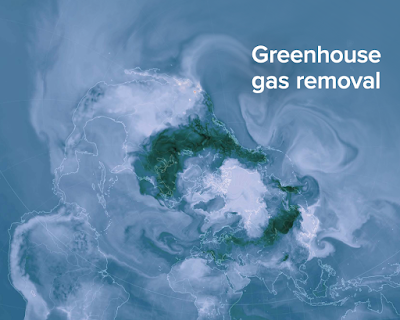In 2017 the Royal Society and Royal Academy of Engineering were asked by the UK Government to consider scientific and engineering views on greenhouse gas removal. This report draws on a breadth of expertise including that of the Fellowships of the two academies to identify the range of available greenhouse gas removal methods, the factors that will affect their use and consider how they may be deployed together to meet climate targets, both in the UK and globally."
"Recommendations
Greenhouse gas removal (GGR) from the atmosphere will be required to fulfil the aims of the Paris agreement on climate change. This report recommends the following international action to achieve this GGR:
RECOMMENDATION 1
Continue and increase global efforts to reduce emissions of greenhouse gases. Large-scale GGR is challenging and expensive and not a replacement for reducing emissions.
RECOMMENDATION 2
Implement a global suite of GGR methods now to meet the goals of the Paris Agreement. This suite should include existing land-based approaches, but these are unlikely to provide sufficient GGR capacity so other technologies must be actively explored.
RECOMMENDATION 3
Build CCS infrastructure. Scenario building indicates that substantial permanent storage, presently only demonstrated in
geological reservoirs, will be essential to meet the scale required for climate goals.
RECOMMENDATION 4
Incentivise demonstrators and early stage deployment to enable development of GGR methods. This allows the assessment of the real GGR potential and of the wider social and environmental impacts of each method. It would also enable the process of cost discovery and reduction.
RECOMMENDATION 5
Incentivise removal of atmospheric greenhouse gases through carbon pricing or other mechanisms. GGR has financial cost at scale and so will require incentives to drive technological development and deployment of a suite of methods.
RECOMMENDATION 6
Establish a framework to govern sustainability of GGR deployment. Undertake rigorous life cycle assessments and environmental monitoring of individual methods and of their use together.
RECOMMENDATION 7
Build GGR into regulatory frameworks and carbon trading systems. In the UK, as an example, active support for GGR implementation (soil carbon sequestration, forestation, habitat restoration) should be built into new UK agricultural or land management subsidies.
RECOMMENDATION 8
Establish international science-based standards for monitoring, reporting and verification for GGR approaches, both of carbon sequestration and of environmental impacts. Standards currently exist for biomass and CCS, but not for GGR methods at large.RECOMMENDATION 5Incentivise removal of atmospheric greenhouse gases through carbon pricing or other mechanisms. GGR has financial cost at scale and so will require incentives to drive technological development and deployment of a suite of methods."
Online Report: https://royalsociety.org/-/media/policy/projects/greenhouse-gas-removal/royal-society-greenhouse-gas-removal-report-2018.pdf
Read the complete report
#jailclimatecriminals #cambio-climatico, #climatecrisis, #climateemergency, #jailclimatecriminals, #criminalesclimáticosdelacárcel, #greenhousegas
"Recommendations
Greenhouse gas removal (GGR) from the atmosphere will be required to fulfil the aims of the Paris agreement on climate change. This report recommends the following international action to achieve this GGR:
RECOMMENDATION 1
Continue and increase global efforts to reduce emissions of greenhouse gases. Large-scale GGR is challenging and expensive and not a replacement for reducing emissions.
RECOMMENDATION 2
Implement a global suite of GGR methods now to meet the goals of the Paris Agreement. This suite should include existing land-based approaches, but these are unlikely to provide sufficient GGR capacity so other technologies must be actively explored.
RECOMMENDATION 3
Build CCS infrastructure. Scenario building indicates that substantial permanent storage, presently only demonstrated in
geological reservoirs, will be essential to meet the scale required for climate goals.
RECOMMENDATION 4
Incentivise demonstrators and early stage deployment to enable development of GGR methods. This allows the assessment of the real GGR potential and of the wider social and environmental impacts of each method. It would also enable the process of cost discovery and reduction.
RECOMMENDATION 5
Incentivise removal of atmospheric greenhouse gases through carbon pricing or other mechanisms. GGR has financial cost at scale and so will require incentives to drive technological development and deployment of a suite of methods.
RECOMMENDATION 6
Establish a framework to govern sustainability of GGR deployment. Undertake rigorous life cycle assessments and environmental monitoring of individual methods and of their use together.
RECOMMENDATION 7
Build GGR into regulatory frameworks and carbon trading systems. In the UK, as an example, active support for GGR implementation (soil carbon sequestration, forestation, habitat restoration) should be built into new UK agricultural or land management subsidies.
RECOMMENDATION 8
Establish international science-based standards for monitoring, reporting and verification for GGR approaches, both of carbon sequestration and of environmental impacts. Standards currently exist for biomass and CCS, but not for GGR methods at large.RECOMMENDATION 5Incentivise removal of atmospheric greenhouse gases through carbon pricing or other mechanisms. GGR has financial cost at scale and so will require incentives to drive technological development and deployment of a suite of methods."
Online Report: https://royalsociety.org/-/media/policy/projects/greenhouse-gas-removal/royal-society-greenhouse-gas-removal-report-2018.pdf
Read the complete report
#jailclimatecriminals #cambio-climatico, #climatecrisis, #climateemergency, #jailclimatecriminals, #criminalesclimáticosdelacárcel, #greenhousegas




No comments:
Post a Comment